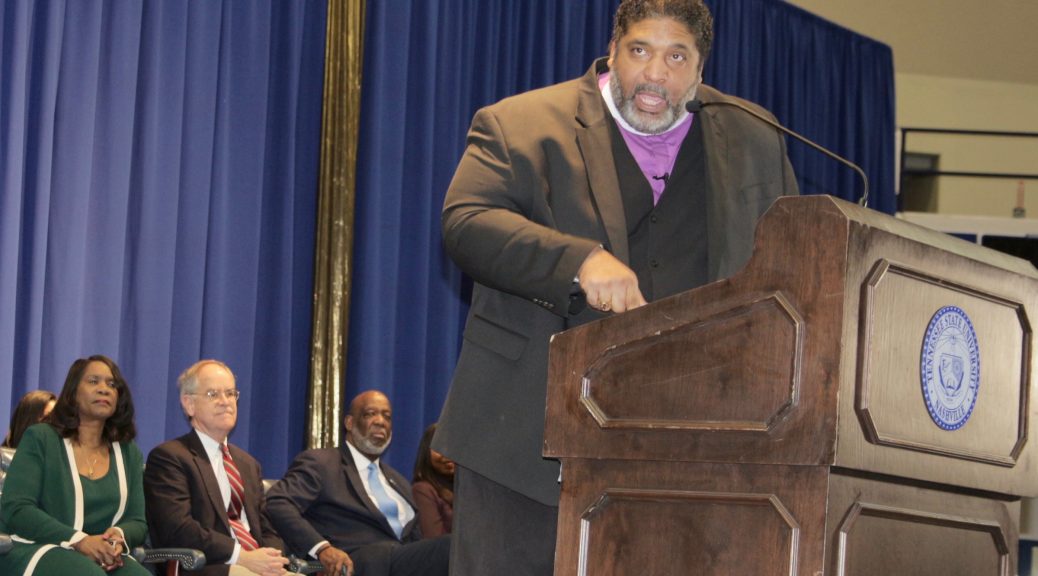NASHVILLE, Tenn. (TSU News Service) – Tennessee State University honored the life and legacy of Dr. Martin Luther King, Jr., on Monday with a convocation that featured prominent civil rights activist, Dr. William Barber II.
The annual event at TSU’s Gentry Complex is in collaboration with the Interdenominational Ministers Fellowship and the Nashville community. Leading up to the convocation, hundreds of people gathered in front of Jefferson Street Missionary Baptist church and marched to the Complex.

Before Barber spoke, attendees heard from TSU President Glenda Glover, newly-elected Tennessee Gov. Bill Lee, Congressman Jim Cooper, Nashville Mayor David Briley, and American Baptist College President Forrest Harris, among others.
“I greet you in the name of excellence and in the name of service,” Glover said. “Service is what this holiday is all about. Dr. Martin Luther King, Jr., said, ‘Everybody can be great, because anybody can serve.’”
In his speech, Barber said that Dr. King was “more than just words,” but action. And like King, people should actively look for ways to address racism, poverty, and other social ills, instead of just talking, or preaching, about them.

“We make a dangerous mistake to suggest that his words were just soaring oratory,” said Barber, national co-chair of the Poor People’s Campaign. “He preached … not only within the quarantine of a sanctuary, but he preached and acted in the streets of the nation. So when we remember Dr. King, it’s not enough to talk about celebration or his oratory. And it’s not enough to say Dr. King just wanted everybody to come together. No, he didn’t. He wanted folks to change. His articulation was turned into liberation.”
Even though Barber is national co-chair of the Poor People’s Campaign, the Goldsboro, North Carolina, pastor is probably best known for his Moral Monday alliance of more than 200 progressive organizations. Over the past six years, that statewide movement has fought for voting rights, public education, universal health care, environmental protection, the rights of women, labor and immigrants, and members of the LGBTQ community.
“What Dr. King wanted was for us to get away from left verses right, conservative verses liberal, and to find a moral center,” Barber said Monday.

On Saturday, TSU hosted the MLK Joint Day of Service with seven other universities and colleges that performed service projects across Metro Nashville.
Sparrow Haynes, a junior human performance sports science major with a concentration in exercise science at TSU, volunteered with a group of students who assisted staff at Hadley Park Regional Center by sanitizing various areas of the facility and setting-up for a father-daughter banquet scheduled for that evening.
“I feel like it is important for us to keep Dr. King’s legacy going,” said Haynes, a Nashville native. “I feel like we should give back just like he did for us.”
To learn about TSU’s Center for Service Learning and Civic Engagement, visit http://www.tnstate.edu/servicelearning/
Department of Media Relations
Tennessee State University
3500 John Merritt Boulevard
Nashville, Tennessee 37209
615.963.5331
About Tennessee State University
With more than 7,000 students, Tennessee State University is Nashville’s only public university, and is a comprehensive, urban, co-educational, land-grant university offering 38 bachelor’s degree programs, 24 master’s degree programs and seven doctoral degrees. TSU has earned a top 20 ranking for Historically Black Colleges and Universities according to U.S. News and World Report, and rated as one of the top universities in the country by Washington Monthly for social mobility, research and community service. Founded in 1912, Tennessee State University celebrated 100 years in Nashville during 2012. Visit the University online at tnstate.edu.
